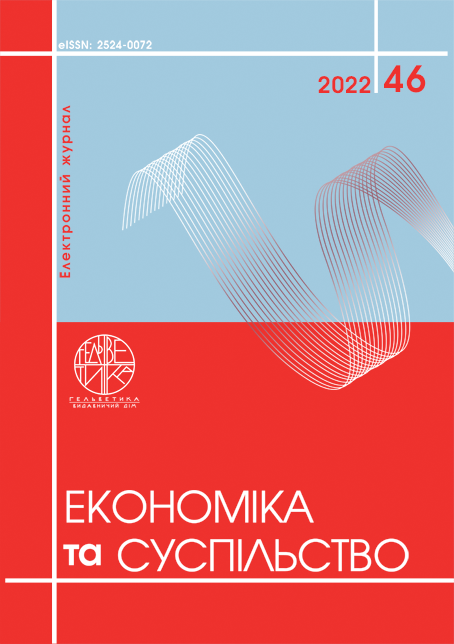THEORETICAL AND METHODOLOGICAL SUPPORT FOR INVESTIGATING TRANSFORMATION OF THE POST-WAR ECONOMY: INSTITUTIONAL AND TERRITORIAL CONTEXT
Abstract
In this article the author's concept of theoretical and methodological support for studying transformation of the post-war economy under conditions of forming a new architectonics of international security and post-industrial societies is created. It is proved that the basis of theoretical and methodological toolkit for studing transformational processes in the economy during the post-war period should be a set of principles: systematicity, integrity, emergentity, relevance, complementarity, historicism. It is justified that the combination of listed scientific knowledge principles is the main methodological determinant of approaches choice to the study of essential and substantive characteristics of the post-war economy transformation. It is claimed that the following approaches are the main ones in the study of transformational processes during the post-war period: systemic, institutional, teleological, tectological, cognitive, gradualist, militarist-doctrinal, sectoral and territorial. It is found that the territorial heterogeneity of using the resource and production potential of the national economy and deepening the decentralization processes require the comprehensive use of territorial and institutional approaches in order to identify the available reserves for accelerating the pace of social and economic development of individual regions, taking into account the benefits and additional opportunities that were formed as a result of the completing the process of territorial communities creation and expanding the powers of local self-government bodies. It is examined that the disclosure of various aspects and components and functional orientation of transformational economic processes during the post-war period will be provided under the condition of using the following groups of research methods: theoretical, institutional, empirical and prognostic. It is proved that the combination of theoretical, institutional, empirical and prognostic research methods will make it possible to substantiate the model of transformation of the post-war economy in Ukraine, taking into account endogenous resources and exogenous risks.
References
Герасименко А.Г. Економічний зміст та напрямки трансформації економічних систем. Економічний вісник. 2015. № 3. С. 7–22.
Громико О. Зміст поняття «трансформація» як базової наукової категорії. Ефективність державного управління. 2016. Вип. 1/2(46/47). Ч. 1. С. 125–131.
Єрохін С.А. Трансформаційний процес та його структуризація. Актуальні проблеми економіки. 2005. № 2(44). С. 4–12.
Івашина С.Ю., Івашина О.Ф. Соціально-інституціональні аспекти економічної трансформації. Проблеми економіки. 2014. № 2. С. 309–314.
Кирилюк Є.М., Прощаликіна А.М. Методологія дослідження процесів трансформації економічних систем у сучасних теоріях. Механізм регулювання економіки. 2011. № 4. С. 172–179.
Малий І.Й., Диба М.І., Галабурда М.К. Держава і ринок: філософія взаємодії. Монографія. Київ : КНЕУ, 2005. 358 с.
Мочерний С.В. Методологія економічного дослідження. Львів : Світ, 2001. 416 с.
Пелех О.Б. Структурні зрушення і трансформації як процеси та результати структурних змін в економіці. Бізнес Інформ. 2018. № 3. С. 8–14.
Поручник А.М. Національний інтерес України: економічна самодостатність у глобальному вимірі. Монографія. Київ : КНЕУ, 2008. 352 с.
Herasymenko A.H. (2015) Ekonomichnyi zmist ta napriamky transformatsii ekonomichnykh system [Economic content and directions of transformation of economic systems]. Ekonomichnyi visnyk, vol. 3, pp. 7–22.
Hromyko O. (2016) Zmist poniattia «transformatsiia» yak bazovoi naukovoi katehorii [The content of the concept of "transformation" as a basic scientific category]. Efektyvnist derzhavnoho upravlinnia, vol. 1/2(46/47) part 1, pp. 125–131.
Ierokhin S.A. (2005) Transformatsiinyi protses ta yoho strukturyzatsiia [The transformation process and its structuring]. Aktualni problemy ekonomiky, vol. 2(44), pp. 4–12.
Ivashyna S.Iu., Ivashyna O.F. (2014) Sotsialno-instytutsionalni aspekty ekonomichnoi transformatsii [Social and institutional aspects of economic transformation]. Problemy ekonomiky, vol. 2, pp. 309–314.
Kyryliuk Ye.M., Proshchalykina A.M. (2011) Metodolohiia doslidzhennia protsesiv transformatsii ekonomichnykh system u suchasnykh teoriiakh [Methodology for researching processes of transformation of economic systems in modern theories]. Mekhanizm rehuliuvannia ekonomiky, vol. 4, pp. 172–179.
Malyi I.I., Dyba M.I., Halaburda M.K. (2005) Derzhava i rynok: filosofiia vzaiemodii. Monohrafiia [The state and the market: philosophy of interaction. Monograph]. Kyiv: KNEU, 358 p.
Mochernyi S.V. (2001) Metodolohiia ekonomichnoho doslidzhennia [Methodology of economic research]. Lviv: Svit, 416 p.
Pelekh O.B. (2018) Strukturni zrushennia i transformatsii yak protsesy ta rezultaty strukturnykh zmin v ekonomitsi [Structural shifts and transformations as processes and results of structural changes in the economy]. Biznes Inform, vol. 3, pp. 8–14.
Poruchnyk A.M. (2008) Natsionalnyi interes Ukrainy: ekonomichna samodostatnist u hlobalnomu vymiri. Monohrafiia [National interest of Ukraine: economic self-sufficiency in the global dimension. Monograph]. Kyiv: KNEU, 352 p.


